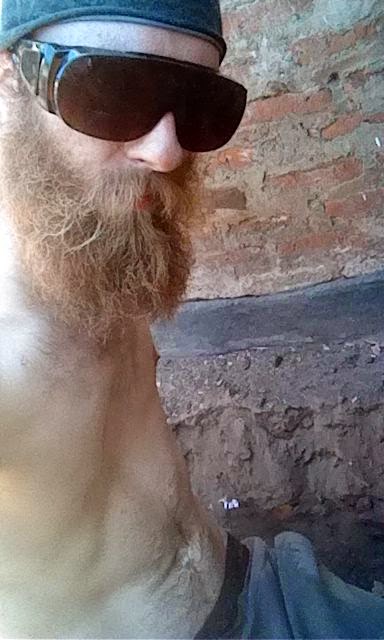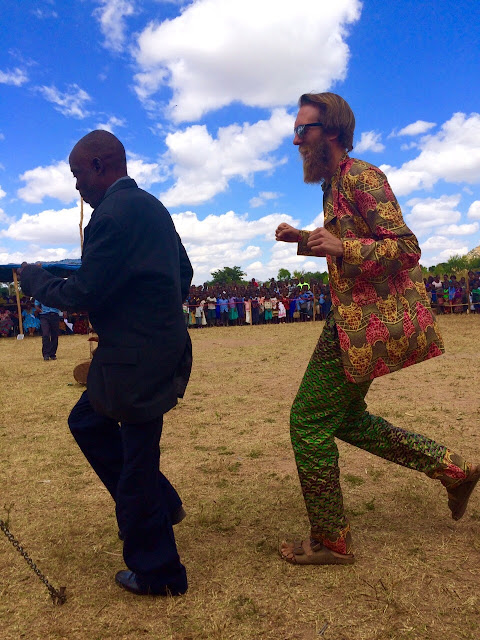Well my last major life update was at 100 days in Malawi, and today (August 12th) marks 160 days! Sorry these posts are so sporadic, but due to poor internet and increasingly frequent blackout it makes using my computer difficult!
Since my last post I've been working daily at the local health center doing small tasks to help out whenever possible (mostly paperwork and talking with staff/patients). Some people from America keep asking me what I am doing here in hopes of hearing some inspiration story or exciting adventure. To be honest, I only have one especially exciting day a week and it's usually just a meeting or meaningful conversation I happen to have with someone. Day to day I'm not living this incredible adventure many friends in America seem to think I'm having - I'm living just like the people around me; chatting, pumping water, cleaning, cooking, helping others when the opportunity arises, etc.
I've been reading a book recently ("The Tibetan Book of Living and Dying") and came across one extremely powerful passage that may help my friends and family in America - both in understanding my life here, and hopefully in improving your own:
"There are different species of laziness: Eastern and Western. The Eastern style consists of hanging out all day in the sun, doing nothing, avoiding any kid of useful activity, drinking cups of tea, listening to music on the radio, and gossiping about friends. Western laziness is quite different. It consists of cramming our lives with compulsive activity, so that there is no time at all to confront the real issues."
To me this is a great comparison of the two cultures - in America if you are walking down the street and see someone whom you want to chat with there are usually 101 reasons why there simply isn't time. In Malawi, however, a passing conversation on the road or at the water pump is common - and many times it ends with a new friend.
This is how one of my first projects began actually! I met my friend Clara who works for Moyo ndi Pamba ("life is capitol") which is a branch of USAID that goes into local villages doing similar work that Peace Corps volunteers do. After a chance meeting one day we decided to work with a community 15 min down the road to construct a community garden. The community worked extremely hard clearing the land, building a fence, and preparing the soil. I was there with them helping to dig the beds, and together we planted 6 beds of tomatoes, beans, leafy greens, cucumber, and even cantaloupe (trying to explain a cantaloupe to someone who has never seen one sure was entertaining). I donated some of my seeds I have brought from America, and after a bit of hard work we finished the garden!
We are planning to start a new garden soon, and after an empowering meeting with Feed the Future (another branch of USAID) last week I think my fellow hospital workers and I are going to plan some cooking demo's and other nutrition related events. I've also been going to "teen club" which is a monthly meeting for children (many under 13) that are living with HIV/AIDS, and in July I will be leading an activity where we will draw pictures to be used as daily reminders to take HIV suppression meds.
Outside of work I've been having plenty of adventures round Malawi also! I've hiked around Zomba Plateau (my favorite place in Malawi, so far) and seen a lot of the major lookouts. Along the trails in Zomba you find many people selling quartz, tourmaline, feldspar, and other gems that they collect from a nearby mountain (Mt. Malosa). Later this month I'm planning to venture up this mountain and see some of the mines they are finding these gems in - I'm really excited about this! I also made a trip up to Cape McClear, one of the most popular tourist locations. Although the water was beautiful, the atmosphere had a very "westerner's vacation" vibe that I wasn't as much a fan of. My favorite moments at the Cape were snorkeling with cichlids and cliff jumping after taking the "Rasta Boat" to otter point.
It's just a few weeks until my next Peace Corps training, and I couldn't be more ready. After this training we will finally be allowed to start our own projects and apply for grant funding. I will be bringing my counterpart and friend Romeo with me to Lilongwe for our training, and after I'm headed to Malawi's biggest music festival Lake of Stars! Big things coming up!
I've included a few pictures below (per usual), hope you enjoy these small windows into my life here in Malawi! Don't be afraid to write me a letter or send me a butterfinger (hint hint), I'm sure we will all be in touch soon one way or another.
-Trevor
^ A few of the gems I've boughten from the people selling up on Zomba (it's an ongoing joke that I spend all my stipend on rocks rather than food, and sometimes its true haha)
^ Clara, Nsulu village, and myself working to create there community garden. The food will go to local families, and the idea is that this garden will inspire other families to plant their own gardens at home!
^ Hiking in Zomba
^ On of the most beautiful views on Zomba
^ Zomba
^ My favorite meal for lunch - Mustard Greens, Tomato, Onion, Spices on Rice (living local)
^ Me and two of my best village friends. These are the two younger brothers (the oldest was working, and the second oldest took the picture). They would come and sit with me on my porch even when we couldn't hold an actual conversation (they only know Chichewa), but after months of being together we laugh and share stories everyday
^ The PCV closest to me recently finished her service (she was a teacher at the secondary school near me), and for her going away party the local church choir sand a few beautiful songs. On the far right (black and checkered shirt) is my language tutor Stuart, and in the red is my counterpart Romeo.
^ To visit my friends staying in Liwonde National Park I take a small boat across the Shire River. On on trip we saw a massive heard of elephants and hippos (both common in my area)
^ This little guy may look cute, but he's a banana theft (he sat next to me eyeing my food for nearly an hour)
^ This gives you an idea of how close these elephants are
^ Only a month or two more till I'm eating the fruits (and vegetables) from my garden!
^ My favorite snack, papaya! Costs about $1, and is almost as big as my head!
^ Another favorite meal: Okra, tomatoes, onion, cumin, garlic, soya pieces, with the Malawian staple nsima






















































